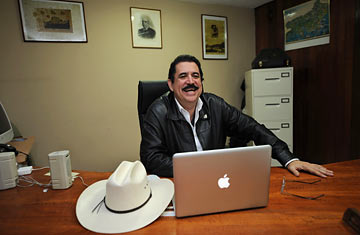
Toppled Honduran President Manuel Zelaya speaks to journalists at the Brazilian embassy in Tegucigalpa.
It's a fairly simple geopolitical rule: small, poor countries can't afford to be global pariahs. The U.S. finally got Honduras to absorb that fact this week, and the result late Thursday night was a long awaited accord between coup-ousted President Manuel Zelaya and de facto President Roberto Micheletti.
The pact may well restore Zelaya to office before the country's Nov. 29 presidential elections. It may also salvage the Obama Administration's standing in the hemisphere. That reputation had faltered in recent months as Obama's commitment to thwarting Honduras' June 28 military putsch came under increasing suspicion in Latin America.
Zelaya's restoration, which would let him finish the last three months of his term, isn't guaranteed under the accord. Instead, he and Micheletti consented to let the Honduras Congress, under the watch of a special verification committee, decide the issue in the coming days. It's not yet clear if Zelaya — who remains holed up in the Brazilian embassy in Tegucigalpa since sneaking back into the country from exile last month — has the votes. His own Liberal Party, in fact, is split over his return. But getting Micheletti to concede even the possibility of Zelaya's reinstatement, which Micheletti and his conservative Republican backers in the U.S. Congress had fanatically opposed from the outset, seems a coup in itself. In the end, both sides agreed on the need "to root the decision [on Zelaya's return] in a democratic institution" rather than international mediation, says Dan Restrepo, President Obama's senior director for Latin America in the National Security Council.
Still, with time running out before the Honduran election, only stepped-up U.S. and international pressure brought Micheletti and Zelaya to an accord. The most effective prod: a threat not to recognize the results of the vote, which would render the next Honduran President persona non grata around the world. Another goad: the continuation of economic sanctions by Washington and blocs like the European Union, which are substantial hardships for one of the Western Hemisphere's smallest (7.8 milliion people) and poorest (a 70% poverty rate) countries.
The U.S. had from the start condemned the coup and backed Zelaya's restoration. But in recent weeks it toyed with the idea of letting the international community oversee next month's election, bless the winner and then broker a deal to restore Zelaya afterward, until his term ends Jan. 27. Diplomats close to the Honduras talks say that when Washington realized it could only get backing for the idea from a handful of countries like Peru and the Bahamas (not from major hemispheric governments like Brazil and Mexico, nor even staunch U.S. ally Colombia), it decided to turn the screws on Micheletti and make it plain that the coup government and its successor would be out in the global cold if Michelletti didn't relent. The U.S., says one high-ranking Latin American diplomat, "decided it had to stop sending [Micheletti] so many mixed signals that made him feel he could dig in and somehow run out the clock."
That new U.S. resolve started last week with a stern phone call from Secretary of State Hillary Clinton to Micheletti, who has cracked down on media outlets and civil liberties since Zelaya's return to Honduras last month. She then dispatched to Tegucigalpa a U.S. delegation led by Restrepo and Thomas Shannon, Assistant Secretary of State for Western Hemisphere Affairs. Shannon downplayed any U.S. strong-arming, insisting the accord resulted "not so much from what we were telling Micheletti but from what other Hondurans were telling Micheletti." In a speech Thursday night, Micheletti called the Zelaya restoration concession "significant" but acknowledged Hondurans "are clamoring to turn our history's page past these difficult moments." For his part, Zelaya, who at times has exasperated U.S. and international mediators with his own hyperventilated statements, said he was "satisfied" and "confident that my reinstatement is imminent."
Honduras has hardly exited its bitterly polarized crisis. Even if Zelaya is reinstated, his powers will be significantly limited by some sort of unity government. Moreover, Micheletti and other coup leaders still feel Zelaya should be prosecuted for defying a Supreme Court order not to hold a referendum on constitutional reform. They were also worried that he planned to eliminate Honduras' ban on presidential re-election and turn the country into a puppet of his left-wing ally, Venezuelan President Hugo Chavez. Those fears were the basis for the June coup. Many Zelaya supporters, meanwhile, feel Micheletti and other coup leaders should stand trial as well. Still, Clinton, amid her visit to Pakistan on Friday, hailed Honduras for being a rare "example of a country in Latin America that, having suffered a rupture of its democratic and constitutional order, overcame such a crisis through negotiation and dialogue."
Shannon, in turn, called the new accord proof that Obama's hemispheric doctrine of "dialogue and engagement" can work. The more imperious Latin America policy practiced by past U.S. administrations often actively supported military coups in the region. The agreement is also a rebuff to the congressional conservatives who have held up key diplomatic appointments (including Shannon's as Ambassador to Brazil) to protest Obama's designation of Zelaya's ouster as a coup.
Many Latin American governments, including Venezuela and its leftist bloc, had criticized Obama in recent months for seeming cowed by that GOP faction. But if the Honduras crisis ends successfully, it could steal thunder from the Chavez bloc and its anti-Washington agenda — and U.S. policy in Latin America might finally enter the 21st century.
